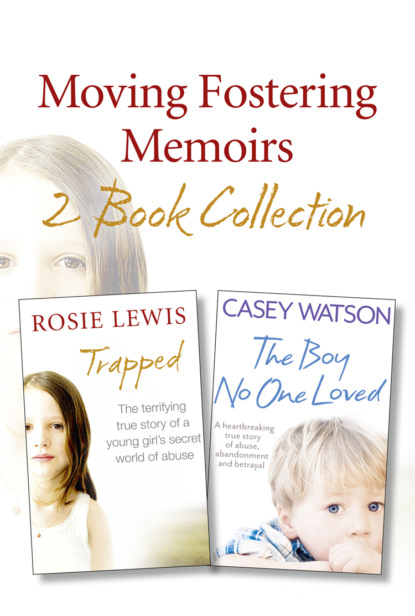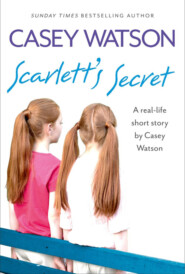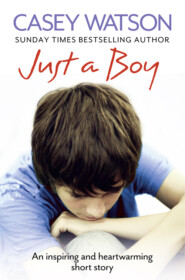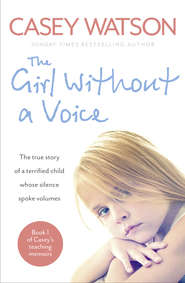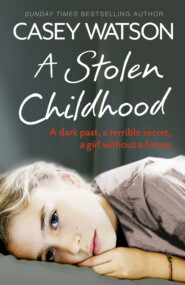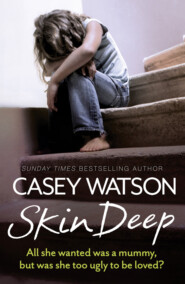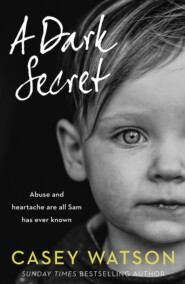По всем вопросам обращайтесь на: info@litportal.ru
(©) 2003-2025.
✖
Moving Fostering Memoirs 2-Book Collection
Настройки чтения
Размер шрифта
Высота строк
Поля
‘You mustn’t say horrible things like that.’
I stared at her, considering my best move. ‘Right, choose something for lunch and then we’ll go,’ I suggested mildly, though my teeth were gritted.
‘Blwah, ew!’ The retching started.
‘Right, let’s go, right now.’
Several heads turned as I slipped my arm around Phoebe’s waist, propelling her towards the checkouts. Shoppers from all angles eyed the pair of us as if we carried some contagious disease. An elderly gentleman stood at the end of our aisle, two bags of shopping planted either side of his feet. He stared openly as we approached. Phoebe squirmed and fought me off, still gagging grotesquely. It was an awful, stomach-churning noise and I felt myself reddening with all the attention being focussed on us.
‘Goodness, your daughter’s clearly out to lunch, my dear,’ the old gentleman whispered loudly in the way old people seem to do, his eyes twinkling with sympathy. ‘It must be very difficult for you.’
Until fostering I had never realised how rude some people could be. I glanced at Phoebe, wondering the effect such thoughtless words would have on her. Fortunately she seemed to be switching her attention elsewhere. Nodding grimly to the elderly customer, I was about to pay for the milk and guide Phoebe out of the shop when I realised that she had spotted the confectionery shelves.
‘Please may I have some chocolate?’ she asked, her eloquence incongruous with her unrefined appearance.
Were it not for the fact that she looked as if she might be in danger of snapping in half right there in the middle of the shop, I would have marched her home empty-handed. As it was, I felt desperate to get some calories inside her, in whatever form I could.
‘Yes, choose something quickly then,’ I told her.
Outside the shop, Phoebe removed the wrapper from her Twix bar, discarding it casually over her shoulder. She was about to tuck into the chocolate when I caught hold of her wrist.
‘Wait a minute, honey. Go and pick up your litter and put it in the bin first.’
‘You do it.’
‘No,’ I said calmly. ‘It’s your wrapper, not mine. You need to pick it up now, before it blows away.’
‘No, leave it there. The bin men will get it when they come.’ Her tone was dismissive. All at once she shoved a third of the bar in her mouth, her cheeks bulging.
Grabbing the rest of the chocolate from her hand, I held it behind my back. Never one to court attention, I felt conspicuous, uncomfortably aware of the glances we were attracting from passers-by. I forced my shoulders back and tried to compose myself.
‘You are not going to eat the chocolate until you deal with the wrapping. By the time I count to five I want you to pick it up and put it where it belongs – in the bin. If you don’t do as I ask, I will throw the chocolate away. Do you understand?’
Dropping her hands to her hips, she splayed her legs to stand her ground, glaring at me. ‘I’m not picking it up and you can’t make me! Give me my chocolate back.’
‘One, t-w-o …’ I counted as slowly as I could, willing her to turn and do as I’d asked. A small crowd had gathered outside the shop, watching the showdown with amused interest.
‘GIVE ME MY FUCKING CHOCOLATE BACK!’ she screamed, her face puce with anger.
As a foster carer, it can sometimes be a challenge to see beyond difficult behaviour and not take it personally, particularly if your own children suffer as a result. Mercifully, with regular mealtimes, a calm environment and a reliable routine in place, most children quickly respond and start to seek out the trusted adult’s approval.
When looking after a ‘challenging’ child, I sometimes find myself recalling previous placements – two-year-old Billy, for example, with his pudgy knees, brown eyes full of mischief and the foulest language I’ve ever heard. After a few weeks in a house where he wasn’t regularly set upon by his sadistic stepfather, the toddler was a delight to be around and began to use words that began with letters other than ‘f’.
‘Three, f-o-u-r …’ Mortified though I was, I couldn’t give in to Phoebe’s demands any more than I could allow her to drink liquid soap. No child could possibly feel secure if they were allowed to wield power over the adults around them. I felt she needed someone to take control and show her that there were limits, lines that I simply wouldn’t allow her to cross. Until she learnt to impose those limits herself, something most children grasped as toddlers, I would have to do it for her. I had to accept that there might be nothing I could do to alleviate the problems associated with autism, but I was determined to help her gain some self-control so that she would feel safe in her own skin.
‘Five,’ I said quietly, dropping the half-mauled bar into the bin and then bending to pick up the wrapper.
Phoebe balled her fists and threw her head back, wailing a tortured roar of fury.
‘Well done, my dear. Good on you!’ The old man who had watched us inside the shop shuffled over and patted my arm. ‘Old-fashioned discipline, that’s what she needs. Shame you didn’t do it when she was a toddler but at least you’re on the right track now. Let’s hope it’s not too late.’
Shamed, I gave him a crooked smile and turned towards home, praying the outraged Phoebe would follow me without further protest.
She repeated everything I said for the rest of the day – apart from the time she spent screaming for no discernible reason. By midday Emily and Jamie had lost all trace of humour and decided to seek refuge in the garden. Shutting themselves away in the summerhouse, essentially a shed with curtains, they played cards and board games for the entire afternoon. How I longed to follow them and draw up the barricades behind me. I felt guilty that the placement was spoiling the start of their school holiday but at least they were together and it was probably best they gave Phoebe a wide berth for a few days, in case she took it into her head to lash out at one of them again.
My attempts to engage Phoebe in some sort of constructive play failed. She seemed to lack any imagination, preferring to walk around in circles like a caged animal, talking incessantly. Every now and again she would enter a period of calm, when she would sit and chat like any other eight-year-old girl. Once or twice I broached the subject of the mother and baby in the shop, explaining that if she couldn’t say anything nice, it would be best not to say anything at all. She responded with a blank expression, as if the incident had been a figment of my imagination. Sometimes it was as if Phoebe had just emerged from a coma and had no access to old knowledge, even if it was from only a few hours earlier.
At least with her hair now clean and less matted, she looked a bit more ‘normal’, bordering on pretty actually, when she wasn’t flapping her arms in a crazy way. I wondered how she behaved at school and whether she had any friends she could play with. She couldn’t seem to sit still, even for a minute. It was as if she had restless leg syndrome that had spread to her whole body (my mum would have called it ‘Syvitis Dance’). Whatever the cause, her strange actions were exhausting to watch and my appetite was shot to pieces by the time we sat down for our meal that evening.
Phoebe’s eyes bulged when I put her dinner on the table, staring at her plate with such horror that anyone would have thought I’d just unveiled a lamb’s head instead of pizza Margherita.
‘What’s wrong, Phoebe? Don’t you like pizza?’
I had tried to find out what she might like to eat during the day, but each time I mentioned food she had gagged. Breakfast had been a small bowl of porridge, Phoebe’s untouched pancake polished off by Emily, who hated to see good chocolate going to waste. She had refused lunch so I was keen for her to eat something that evening. I thought I couldn’t go wrong with a trusty Italian meal. Every child I had fostered so far had had food issues, but usually it was a case of trying to stop them from gorging themselves until they were sick.
Phoebe pushed her plate away, retching. ‘I want porridge,’ she choked, her eyes irresistibly glued to the source of her revulsion.
Emily lowered her own pizza slowly to her plate and Jamie screwed up his face, staring at Phoebe in disgust. ‘Can you stop her making that noise, Mum?’ he asked, his chin tucked close to his chest as if close to throwing up himself.
I whipped Phoebe’s plate away, slipping it onto the bookshelf behind me. Her shoulders sagged in relief but she continued to make gagging noises.
‘Alright, that’s enough, Phoebe. Take some deep breaths – it’s gone now. But you must tell me what sort of thing you eat at home, so I can get something you like.’
‘I only eat porridge,’ she said, her breath coming in short gasps. She was almost in tears. Her eyes were still bulging as if food were somehow a threat to her safety.
‘Yes, I know you prefer porridge for breakfast, but what do you like for lunch and dinner?’
‘What do you like for lunch and dinner?’ she mocked, then clamped her hand over her mouth. My concern was suspended by a moment’s jubilation. She realises, I thought, she actually knows what she’s doing. I wasn’t quite sure what the implications were but for some reason I was filled with a sense of optimism.
‘I only eat porridge, nothing else. Oh, except chocolate. Anything else makes me …’ she retched again, exaggeratedly. ‘Blwha, sick.’
Emily and Jamie exchanged disgusted glances.
‘Can we leave the table, Mum?’ they chorused.
‘Yes, OK. You can watch TV while you eat your pizza, if you want,’ I said, breaking one of our chief house rules. Usually I was quite strict about eating our meals at the table. It was just about the only time in the day when we had a proper, uninterrupted conversation but if our chat was to be interspersed with Phoebe’s throat spasms, I supposed it was worth skipping.
Phoebe sat pinching her bare arm, her eyes staring glassily ahead, while I picked at the rest of my meal. Seemingly oblivious to the red marks forming on her skin, she increased the pressure, twisting and digging away with short, bitten nails. Just what is going on inside your head? I wondered, sensing a dark undercurrent.
That night I lay in bed, filled with a sense of impending doom. Phoebe had eaten very little that day, despite all my coaxing. Before she went to bed I had made her another bowl of porridge with a heavy grating of chocolate on top and she had nibbled at it but without any gusto. Could it be possible that porridge was literally all she ever ate?
Still, I thought, trying to focus on the positives, at least Emily and Jamie seemed to be coping well with Phoebe’s arrival. There were times when their own lives hadn’t been easy; their father and I had separated eight years earlier when they were much younger. I registered as a foster carer soon after my divorce and in a way I think fostering helped ease the transition from a nuclear to a single-parent family. Our house seemed much livelier with lots of children around, even those troubled and withdrawn. Though their dad, who lives less than a mile away from us, was and still is a big part of their lives, Emily and Jamie always missed the chaos that comes with being part of a full family, whenever it was just the three of us at home.
It was the sound of their laughter earlier that had helped me through the gruesomeness of our first full day with Phoebe. I felt so proud of them: not only were they kind and loving, they possessed a wonderful ability to laugh at the downright awful, a gift inherited from their father. Somehow, remembering their capacity for humour helped me in marshalling my own and my low mood slowly lifted.
But it wasn’t just fretting over Phoebe’s starvation diet that was keeping me awake: knots in my stomach reminded me that I had to supervise a contact session between Phoebe and her parents in the morning. When children are removed without parental consent, contact usually takes place under the supervision of contact workers employed by the local authority, but since Phoebe was in voluntary care, the arrangement was to be more flexible.
Curious as I was to find out what her parents were like, contact was one of the tasks of fostering that I dreaded. Looking after the children was often the easy bit; Looked After Children (LAC) reviews, Child Protection Conferences and contact sessions, in fact anything involving other adults was the unappealing side of the job as far as I was concerned. Being a natural introvert, I tended to shy away from meetings, particularly when there was the possibility of confrontation.





